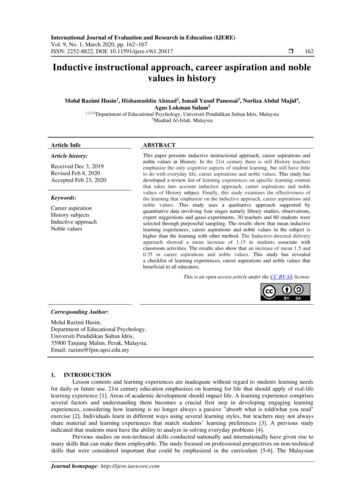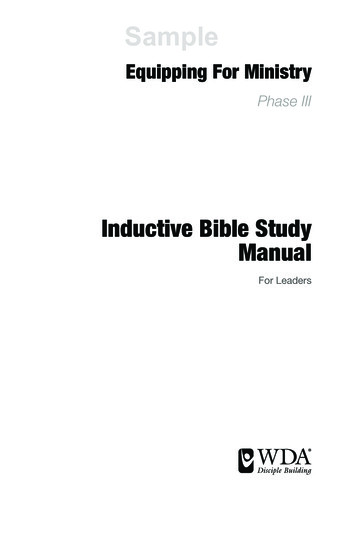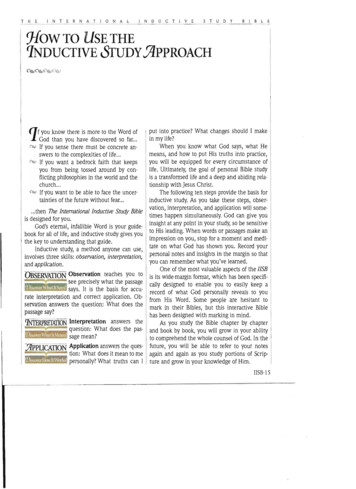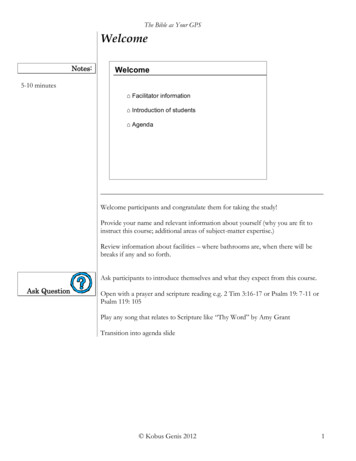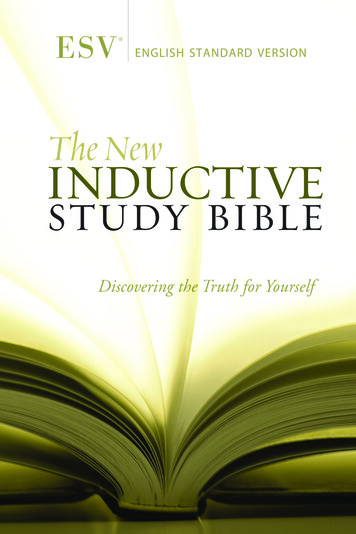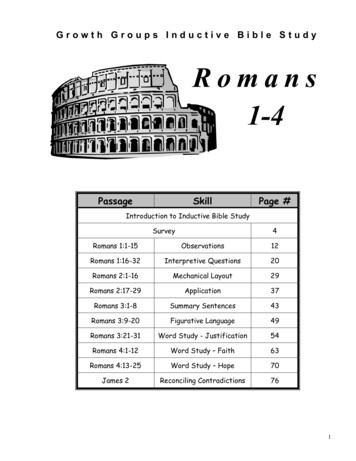
Transcription
A NI N D U C T I V EB I B L ES T U DY
Version 4.0 - Copyright 2016 Grace Bible Church, College Station, TXVersion 3.0 - Copyright 2009 Grace Bible Church, College Station, TXVersion 2.0 - Copyright 2004 Grace Bible Church, College Station, TXVersion 1.0 - Copyright 1995 Grace Bible Church, College Station, TXCreated and edited by the pastors and staff of Grace Bible ChurchScripture taken from the NEW AMERICAN STANDARD BIBLE , Copyright 1960, 1962, 1963, 1968, 1971, 1972, 1973, 1975, 1977, 1995by The Lockman Foundation, used by permission.This document may be reproduced and distributed freely,but you may not charge a fee greater than your manufacturing costs.No section of this document may be modified without the written consentof Grace Bible Church, College Station, TX.
EphesiansA NI N D U C T I V EB I B L ES T U D Y
CONTENTSEPHESIANS SURVEY6LESSON 1 - EPHESIANS 1:1-1411L E S S O N 2 - E P H E S I A N S 1 : 1 5- 2 3 & 3 : 1 4 - 2 119LESSON 3 - EPHESIANS 2:1-1029L E S S O N 4 - E P H E S I A N S 2 : 1 1- 3 : 1 337LESSON 5 - EPHESIANS 4:1-1647L E S S O N 6 - E P H E S I A N S 4 : 1 7- 3 255LESSON 7 - EPHESIANS 5:1-1463L E S S O N 8 - E P H E S I A N S 5 : 1 5- 6 : 971L E S S O N 9 - E P H E S I A N S 6 : 1 0- 2 481EPHESIANS SYNTHESIS89APPENDICESA . B I B L E S T U DY TO O L S OV E R V I E W95B . A D D I T I O N A L S T U DY R E S O U R C E S100C . N E W T E S TA M E N T C H R O N O LO GY1014
WELCOMEWelcome to our study of Ephesians, a book that highlights the high calling and conduct of the church,the corporate body of Jesus Christ. Throughout this rich book, we will learn about the church’sinherited stewardship, multi-ethnic identity, distinct lifestyle, and spiritual opposition.The nine lessons in this packet are designed to walk us through this challenging book of the Bible. Inthe Survey, we will look at the overall message of the book of Ephesians. The next nine lessons will focuson studying key passages in detail. Then in the Synthesis, we will summarize what we have learned forfuture reference.In studying each passage in detail, we will be learning and using a number of basic Bible study methods.These methods fit under three fundamental skills that are meant to be practiced in order each week.OBSERVEINTERPRETA P P LYWhat do I see?What does it mean?How does it work?These skills are summarized in the “Bible Study Tools Overview” that you can flip back through duringyour study. You can find it along with other advanced Bible study skills in the Appendix for those whowant to go deeper in their study.As you use this packet to study Ephesians, please keep in mind a couple of things. There are morequestions than you may have time to answer in any given lesson. So focus on the questions that seemmost significant to understanding the passage’s meaning. And make sure that you don’t skip your ownobservations of the passage as this is the most important step of Bible study.5
EPHESIANS SURVEYSee the Big PictureP R AYBegin this time in prayer, confessing any sins you know of, thanking the Lord for the gift of His Word,and asking for His Spirit to illuminate your study.S U R V E Y : What is the big idea?Surveying a book like Ephesians allows you to grasp the big picture and the overall storyline ofthe book before getting caught up in the details. This survey provides a helpful road map to guideyour study during the coming weeks. So begin this crucial first step by taking the nextthirty minutes to read straight through Ephesians without stopping. Then, answer thequestions below before moving on to the next page.1. How would you describe Paul’s relationship to these believers?2. What are the major themes or big ideas in this book? (Hint: Look for repeated words and ideas.)3. Now that you have read through the entire book, what are Paul’s purposes in writing it? Be as specific as you can.4. Based only on Ephesians, how do calling and conduct relate to one another?6
B AC KG R O U N DOnce you have completed the introductory questions on the previous page, read this background article on thebook of Ephesians (portions compiled from The Bible Knowledge Commentary and Nelson’s Illustrated BibleDictionary).AU T H O R S H I PPaul was born in Tarsus into Roman citizenship (Acts 22:28) and later educated under the illustrious rabbi,Gamaliel (Acts 22:3). Zealous for the Law, Paul became the chief persecutor of the early church until his conversion when Jesus Christ appeared to him on the road to Damascus (Acts 9). Immediately, Paul began to proclaimJesus as Savior, eventually focusing several missionary journeys to the Gentiles throughout Asia Minor. Duringhis journeys, he traveled to Ephesus and ministered there for almost three years (Acts 20:31). After Paul departedfrom Ephesus, he left Timothy behind to combat false teaching (1 Timothy 1:3). At some later point, Paul wrotethis letter while in prison either in Caesarea or Rome as one of his many “Prison Epistles” in A.D. 60-62. Despiterecent debate that the book was written by someone who did not use his own name but instead claimed to bePaul, there is no strong reason to reject Pauline authorship of the book.RECIPIENTSEphesus was a leading city on the west coast of Asia Minor. It essentially linked the western and eastern portionsof the Roman Empire on the main highway and even possessed the most favorable seaport in the province of Asia.Due to its location within the Empire, Ephesus exerted great influence culturally, economically, and religiously.With a population over 300,000 people, Ephesus contained a theatre that seated an estimated 25,000 people. Itbecame the center for worship of the goddess Artemis (Diana in Roman mythology), which often included templeprostitution. Her temple ranked as one of the Seven Wonders of the Ancient World and became not just a centerfor worship but also the primary banking institution for all of Asia Minor. As a result, Paul’s apostolic ministrythat turned people to Christ and away from Artemis represented a significant financial threat to temple-relatedbusinesses like that of the silversmith, Demetrius (Acts 19:23-41). Ephesus also became a center of occult practice as many used magic, witchcraft, and sorcery to manipulate hostile spiritual powers to their advantage (Acts19:11-20).7
The Mediterranean region as Paul traveled to Ephesians for first time. From the NET BIBLE on Bible.org.PURPOSEPaul’s letter to the Ephesian believers does not seem concerned with any particular heresies as we see in Galatiansand Colossians, nor with any particular occurrences of immorality as 1 Corinthians. Rather, Paul’s purposes areto declare the glory of God and the extravagant riches given to the Church. Paul focuses on the call, identity, andconduct of the Church, the body of Christ, throughout this rich epistle.8
OUTLINE THE BOOKHaving read the background article on the book of Ephesians, now skim through Ephesians one more time andcreate your own title for each of the major sections below (you can divide these into smaller sections, each withits own title, if you wish). Do not use the titles in this packet or in your Bible. Create your own titles that captureyour understanding of the main idea of each section.M Y E P H E S I A N S O U T L I N E .p 1:1-14p 4:1-16p 1:15-23p 4:17-32p 2:1-10p 5:1-14p 2:11-22p 5:15-33p 3:1-13p 6:1-9p 3:14-21p 6:10-249
10
LESSON 1Rejoice in BlessingE P H E S I A N S1 : 1 - 1 4P R AYBegin this time in prayer, confessing any sins you can recall, thanking the Lord for the gift of His Word, andasking for His Spirit to guide your study.M E M O R I Z EEphesians 1:3 -- Write it out to get your memorization started.11
What Do I See?OBSERVERefer to AppendixEPHESIANS 1:1-14Paul, an apostle of Christ Jesus by the will of God, To the saints who are at Ephesus and who are1faithful in Christ Jesus: 2Grace to you and peace from God our Father and the Lord Jesus Christ.Blessed be the God and Father of our Lord Jesus Christ, who has blessed us with every spiritual blessing in the3heavenly places in Christ, 4just as He chose us in Him before the foundation of the world, that we would be holy andblameless before Him. In love 5He predestined us to adoption as sons through Jesus Christ to Himself, according tothe kind intention of His will, 6to the praise of the glory of His grace, which He freely bestowed on us in the Beloved.7In Him we have redemption through His blood, the forgiveness of our trespasses, according to the riches of Hisgrace 8which He lavished on us. In all wisdom and insight 9He made known to us the mystery of His will, accordingto His kind intention which He purposed in Him 10with a view to an administration suitable to the fullness of thetimes, that is, the summing up of all things in Christ, things in the heavens and things on the earth. In Him 11alsowe have obtained an inheritance, having been predestined according to His purpose who works all things afterthe counsel of His will, 12to the end that we who were the first to hope in Christ would be to the praise of His glory.In Him, you also, after listening to the message of truth, the gospel of your salvation—hav-13ing also believed, you were sealed in Him with the Holy Spirit of promise,who is given as a pledge14of our inheritance, with a view to the redemption of God’s own possession, to the praise of His glory.12
O B S E R VAT I O N Q U E S T I O N S :1. Underline or highlight the names of God you observe in this passage. This should include names of any individual members of the Trinity.2. List all of the “spiritual blessings” you see in this passage given by God to believers.O B S E R VAT I O N Svv 1-3vv 4-7vv 8-10vv 11-1413
What Does it Mean?INTERPRETRefer to Appendix1. Refer back to your list of “spiritual blessings” mentioned in this passage. What role does each Person of theTrinity (the Father, the Son, and the Holy Spirit) play in providing us these blessings?2. What does “redemption” mean (see Romans 8:23; Colossians 1:14; Hebrews 9:15; 11:35)? What did it costand who paid the cost? What motivated this cost to be paid for us?3. What does it mean to be “sealed with the Holy Spirit” (1:13)? What must a person do to receive this? Howdoes this sealing relate to our inheritance and redemption?4. What does Paul mean by “adoption as sons” (See Romans 8:15-17.)? How did it occur?14
5. According to 1:4-6; 11-12; and Romans 8:23-30 - What does it mean to be “chosen” or “predestined” by God?- When did God predestine us?- Why did God predestine us? In other words, what is the purpose of His choice?- Why does any of this really matter? Is predestination just a big theological debate, or does it have apractical application to our lives?6. Should we be looking for apostles like Paul to lead us today? Why or why not? To answer this question lookup 1 Corinthians 9:1-2; 12:28-30; 2 Corinthians 12:12; Galatians 1:1; Ephesians 2:19-22; and 3:1-7 and considerthese questions:- What is the basic meaning of the title “apostle”?- What qualifications did an apostle need?- What were the responsibilities of an apostle?15
How Does it Work?A P P LYREFLECT ON YOUR LIFE:1. God wants the truth of these spiritual blessings to affect our lives. How should these truths.- Affect your self-worth or opinion of yourself?- Benefit you when you go through hard times or commit sin?2. Spend a few minutes thanking God for these spiritual blessings.16
RELATIONAL APPLICATIONRefer to AppendixFill in the graph below by answering these questions: What is the most significant truth or principle you learned in this lesson? How does this truth impact the four relational spheres of your life? How can I integrate this truthinto my work or ministry? How does this truth affect myrelationship with God? How does this truth challengeme regarding my family/friends?GODHow can I engage the worldaround me?WO R L D 17FA M I LY / F R I E N D SM I N I S T RY / WO R KMAIN TRUTH:
18
LESSON 2Pray with PowerE P H E S I A N S1 : 1 5 - 2 3&3 : 1 4 - 2 1P R AYBegin this time in prayer, confessing any sins you can recall, thanking the Lord for the gift of His Word, andasking for His Spirit to guide your study.R E F L E C TThink about your current prayer life. What do you ask God for? Are you requesting the best, most important things or secondary things most of the time? How do you know what’s best to ask Him for?M E M O R I Z EEphesians 1:18-19a -- Write it out to get your memorization started.19
What Do I See?OBSERVERefer to AppendixEPHESIANS 1:15-2315For this reason I too, having heard of the faith in the Lord Jesus which exists among you and your love for allthe saints, 16do not cease giving thanks for you, while making mention of you in my prayers; 17that the God ofour Lord Jesus Christ, the Father of glory, may give to you a spirit of wisdom and of revelation in the knowledge of Him. 18I pray that the eyes of your heart may be enlightened, so that you will know what is the hopeof His calling, what are the riches of the glory of His inheritance in the saints, 19and what is the surpassinggreatness of His power toward us who believe. These are in accordance with the working of the strength of Hismightwhich He brought about in Christ, when He raised Him from the dead and seated Him at His right20hand in the heavenly places, 21far above all rule and authority and power and dominion, and every name thatis named, not only in this age but also in the one to come. 22And He put all things in subjection under His feet,and gave Him as head over all things to the church, 23which is His body, the fullness of Him who fills all in all.O B S E R VAT I O N Q U E S T I O N S :1. List the specific things Paul prays for in 1:15-23 and 3:14-21.2. List some of the similarities and differences you notice between Paul’s prayers in 1:15-23 and 3:14-21.20
3. What key words do you notice in this passage? These are words that are theologically significant or that setthe theme or big idea for the passage.O B S E R VAT I O N Svv 15-16vv 17-18vv 19-21vv 22-2321
O B S E R VAT I O N S C O N T I N U E DEPHESIANS 3:14-21For this reason I bow my knees before the Father, 15from whom every family in heaven and on earth derives its14name, 16that He would grant you, according to the riches of His glory, to be strengthened with power through HisSpirit in the inner man, 17so that Christ may dwell in your hearts through faith; and that you, being rooted andgrounded in love, 18may be able to comprehend with all the saints what is the breadth and length and height anddepth, 19and to know the love of Christ which surpasses knowledge, that you may be filled up to all the fullness ofGod. 20Now to Him who is able to do far more abundantly beyond all that we ask or think, according to the power thatworks within us, 21to Him be the glory in the church and in Christ Jesus to all generations forever and ever. Amen.22
O B S E R VAT I O N Svv 14-15vv 16-17vv 18-19vv 20-2123
What Does it Mean?INTERPRETRefer to Appendix1. Paul begins 1:15 by saying, “For this reason .” To which reason is he referring?2. What is the primary thing Paul asks for in this prayer? Why does he place such emphasis on this request?3. What do we learn about each Person of the Trinity in these prayers? Consider the following .- To which of them should we pray? Why? (See 1 Corinthians 15:22-28.)- What role does the Holy Spirit play in our lives?- Where is Jesus now, and what is He doing?24
- What is the significance of being “at the right hand” of God? (See Acts 5:31; Hebrews 1:3-13.)4. Rewrite Paul’s prayer for the Ephesians in 1:15-23 in your own words. What, specifically, does he ask Godfor? (Hint: Try to define the meaning of phrases like “a spirit of wisdom and of revelation” and “the eyes ofyour heart may be enlightened.”)5. What effect can our prayers have on the lives of others or our own lives (See Luke 11:9-10; 2 Corinthians 1:811; James 4:2; 5:14-18.)?6. How does this passage relate to the previous passage? In other words, how does the content of Paul’s prayerin 1:15-23 relate to the believers’ blessings in 1:1-14?7. How does Paul’s long description of Christ in 1:21-23 relate to our practice of prayer?25
How Does it Work?A P P LYREFLECT ON YOUR LIFE:1. Based on Paul’s example of prayer, how would you like your own prayer life to change?2. Are you currently praying for fellow believers? If so, how do you keep track of what you pray for and howGod responds to your prayers? If not, list five names of believers in your life, and pray for each of them eachday this week.26
RELATIONAL APPLICATIONRefer to AppendixFill in the graph below by answering these questions: What is the most significant truth or principle you learned in this lesson? How does this truth impact the four relational spheres of your life? How can I integrate this truthinto my work or ministry? How does this truth affect myrelationship with God? How does this truth challengeme regarding my family/friends?GODHow can I engage the worldaround me?WO R L D 27FA M I LY / F R I E N D SM I N I S T RY / WO R KMAIN TRUTH:
28
LESSON 3Stand in GraceE P H E S I A N S2 : 1 - 1 0P R AYBegin this time in prayer, confessing any sins you can recall, thanking the Lord for the gift of His Word, andasking for His Spirit to guide your study.M E M O R I Z EEphesians 2:8-9 -- Write it out to get your memorization started.29
What Do I See?OBSERVERefer to AppendixEPHESIANS 2:1-10And you were dead in your trespasses and sins, 2in which you formerly walked according to the course of this1world, according to the prince of the power of the air, of the spirit that is now working in the sons of disobedience. 3Among them we too all formerly lived in the lusts of our flesh, indulging the desires of the flesh andof the mind, and were by nature children of wrath, even as the rest. 4But God, being rich in mercy, becauseof His great love with which He loved us, 5even when we were dead in our transgressions, made us alive together with Christ (by grace you have been saved), 6and raised us up with Him, and seated us with Him inthe heavenly places in Christ Jesus, 7so that in the ages to come He might show the surpassing riches of Hisgrace in kindness toward us in Christ Jesus. 8For by grace you have been saved through faith; and that not ofyourselves, it is the gift of God; 9not as a result of works, so that no one may boast. 10For we are His workmanship, created in Christ Jesus for good works, which God prepared beforehand so that we would walk in them.O B S E R VAT I O N Q U E S T I O N S :1. List all of Paul’s descriptions of the former life of his audience (2:1-3). What used to be true of them?30
2. What has God done for us according to verses 4-10? In particular, look for verbs that describe His actionstowards us.3. What key words do you notice in this passage? These are words that are theologically significant or that setthe theme or big idea for the passage.O B S E R VAT I O N Svv 1-3vv 4-5vv 6-7vv 8-1031
What Does it Mean?INTERPRETRefer to Appendix1. What does Paul mean by “dead” in 2:1 (See Genesis 2:16-17; Isaiah 59:2; Romans 5:12-21; 7:8; Ephesians4:18; 1 Timothy 5:6.)?2. Who is the prince of the power of the air (See 6:11-12.)? What power and authority does he have now (See 2Corinthians 4:4; 1 John 4:4; 5:19.)?3. What is “wrath” and what does it mean to be “by nature children of wrath” in 2:3?4. Based on your answers to the above questions, describe a person’s condition without Christ. Do non-Christians realize their condition? Why or why not?5. According to verses 4-7, what motivated God to save us?32
6. Define the following key words in this passage:- “Grace” (See Romans 5:15-17.)- “Works” (See Romans 4:1-5 and Titus 3:5.)- “Saved” (See 1 Timothy 1:15-16.)- “Faith” (See Ephesians 1:13.)7. God’s salvation of us is described with three main verbs in verses 4-6. For each one, define exactly what Paulmeans. See Romans 6:1-14 for help in defining these terms.- “Made us alive together with Christ”- “Raised us up with Him”- “Seated us with Him” (See also 1:20.)8. How does 2:10 relate to 2:8-9? In other words, how do good works relate to our salvation (See alsoTitus 2:11-14.)?33
How Does it Work?A P P LYREFLECT ON YOUR LIFE:1. If you were to stand before God tonight and He was to ask you, “Why should I let you into heaven?” whatwould you say?2. How does God’s grace affect your daily life? How does it change the way you see yourself, the way you seeothers, and the way you act?34
RELATIONAL APPLICATIONRefer to AppendixFill in the graph below by answering these questions: What is the most significant truth or principle you learned in this lesson? How does this truth impact the four relational spheres of your life? How can I integrate this truthinto my work or ministry? How does this truth affect myrelationship with God? How does this truth challengeme regarding my family/friends?GODHow can I engage the worldaround me?WO R L D 35FA M I LY / F R I E N D SM I N I S T RY / WO R KMAIN TRUTH:
36
LESSON 4Invest in FamilyE P H E S I A N S2 : 1 1 - 3 : 1 3P R AYBegin this time in prayer, confessing any sins you can recall, thanking the Lord for the gift of His Word, andasking for His Spirit to guide your study.B AC KG R O U N DThe “Barrier of the Dividing Wall”Almost 1500 years before Jesus came God gave His chosen people, the Jews, a book of commandmentsthrough their leader, Moses, which we call the “Mosaic Law.” God meant for this Law to make the Jewish people an attractive light and an example of righteousness to the Gentile nations of the world so thatGentiles would be drawn to worship the One True God. But in the centuries before Jesus came, the Jewssabotaged God’s intention by creating their own tradition around the Law, adding such numerous andcomplex requirements that most people, even most Jews, couldn’t hope to obey it all. For the scholarlyJews who could keep this tradition (the “Pharisees” and “scribes”) this led to an attitude of superiorityand racial pride. To the Gentiles, this tradition only drove them further from God and stirred up hatredtowards the Jews. But then Jesus came and not only strongly rebuked the Pharisees for their oppressivetradition, but in His death fulfilled and abolished the Mosaic Law (Rom 10:4; Gal 3:13). With the Lawnow set aside, the basis for the Jews’ oppressive tradition was gone. Now both Jews and Gentiles canbecomes followers of Christ on equal terms – the “dividing wall” has been broken down.M E M O R I Z EEphesians 2:19 -- Write it out to get your memorization started.37
What Do I See?OBSERVERefer to AppendixEPHESIANS 2:11-22Therefore remember that formerly you, the Gentiles in the flesh, who are called “Uncircumcision” by the11so-called “Circumcision,” which is performed in the flesh by human hands—remember that you were12at that time separate from Christ, excluded from the commonwealth of Israel, and strangers to the covenants of promise, having no hope and without God in the world. 13But now in Christ Jesus you who formerly were far off have been brought near by the blood of Christ. 14For He Himself is our peace, who madeboth groups into one and broke down the barrier of the dividing wall, 15by abolishing in His flesh the enmity, which is the Law of commandments contained in ordinances, so that in Himself He might make the twointo one new man, thus establishing peace,and might reconcile them both in one body to God through16the cross, by it having put to death the enmity. 17AND HE CAME AND PREACHED PEACE TO YOU WHOWERE FAR AWAY, AND PEACE TO THOSE WHO WERE NEAR; 18for through Him we both have our accessin one Spirit to the Father. 19So then you are no longer strangers and aliens, but you are fellow citizens withthe saints, and are of God’s household,having been built on the foundation of the apostles and prophets,20Christ Jesus Himself being the corner stone, 21in whom the whole building, being fitted together, is growinginto a holy temple in the Lord, 22in whom you also are being built together into a dwelling of God in the Spirit.38
O B S E R VAT I O N Q U E S T I O N S :1. Make two lists. In the first, write down all of Paul’s descriptions of the Gentiles’ former status and conditionbefore Christ. In the second, write down all of Paul’s descriptions of their new status and condition now thatChrist has come.2. What key words do you notice in this passage? These are words that are theologically significant or that setthe theme or big idea for the passage.O B S E R VAT I O N Svv 11-13vv 14-16vv 17-19vv 20-2239
O B S E R VAT I O N S C O N T I N U E DEPHESIANS 3:1-13For this reason I, Paul, the prisoner of Christ Jesus for the sake of you Gentiles— 2if indeed you have heard of1the stewardship of God’s grace which was given to me for you; 3that by revelation there was made known to methe mystery, as I wrote before in brief. 4By referring to this, when you read you can understand my insight intothe mystery of Christ, 5which in other generations was not made known to the sons of men, as it has now beenrevealed to His holy apostles and prophets in the Spirit; 6to be specific, that the Gentiles are fellow heirs andfellow members of the body, and fellow partakers of the promise in Christ Jesus through the gospel, 7of which Iwas made a minister, according to the gift of God’s grace which was given to me according to the working of Hispower. 8To me, the very least of all saints, this grace was given, to preach to the Gentiles the unfathomable richesof Christ, 9and to bring to light what is the administration of the mystery which for ages has been hidden in Godwho created all things; 10so that the manifold wisdom of God might now be made known through the church tothe rulers and the authorities in the heavenly places. 11This was in accordance with the eternal purpose whichHe carried out in Christ Jesus our Lord, 12in whom we have boldness and confident access through faith in Him.Therefore I ask you not to lose heart at my tribulations on your behalf, for they are your glory.1340
O B S E R VAT I O N Svv 1-3vv 4-7vv 8-10vv 11-1341
What Does it Mean?INTERPRETRefer to Appendix1. .Create and answer any two of your own interpretive questions from this passage. For instructions,see page 96.a)b)2. According to this passage, what changes resulted from Christ’s work on the Cross?3. What does Paul mean by saying that in the past Gentiles, non-Jews like most of us, lived without hope andwithout God? To find out, answer the questions below. Use the following passages to develop your answers:Genesis 12:1-3; Exodus 19:5-6; Numbers 15:14-16; 1 Kings 8:41-43; Psalms 147:19-20; Isaiah 56:6-7; Acts14:16-17; 17:24-31; Romans 3:1-2; 9:3-5.- Did God care about Gentiles during Old Testament times?- Could Gentiles have a relationship with God during Old Testament times? If so, what did Godrequire of them?42
- What exactly did Jews possess that Gentiles lacked?4. Paul uses the analogy of a “body” in 2:19-22 to characterize this new community of Jews and Gentiles. Whatdoes this figurative language teach us about the church body?5. According to Ephesians 3:3-6, what does Paul mean by the word “mystery”? What exactly was the mysterythat has now been revealed?6. According 3:8-12, why did God create the church? In other words, what role does the church play in God’splan for human history?43
How Does it Work?A P P LYREFLECT ON YOUR LIFE:1. Where do you see examples of inequality or discrimination in society today? What can believers do to healthese divisions?2. Do you approach your spiritual life and your relationship with God primarily as an individual pursuit or assomething you do in community with other believers? Why?3. This week, what specific thing can you do to promote the unity of the church? Do you need to apologize tosomeone, forgive someone, encourage someone, serve someone, etc?44
RELATIONAL APPLICATIONRefer to AppendixFill in the graph below by answering these questions: What is the most significant truth or principle you learned in this lesson? How does this truth impact the four relational spheres of your life? How can I integrate this truthinto my work or ministry? How does this truth affect myrelationship with God? How does this truth challengeme regarding my family/friends?GODHow can I engage the worldaround me?WO R L D 45FA M I LY / F R I E N D SM I N I S T RY / WO R KMAIN TRUTH:
46
LESSON 5Walk in UnityE P H E S I A N S4 : 1 - 1 6P R AYBegin this time in prayer, confessing any sins you can recall, thanking the Lord for the gift of His Word, andasking for His Spirit to guide your study.M E M O R I Z EEphesians 4:1-2 -- Write it out to get your memorization started.47
What Do I See?OBSERVERefer to AppendixEPHESIANS 4:1-16Therefore I, the prisoner of the Lord, implore you to walk in a manner worthy of the calling with which you have1been called, 2with all humility and gentleness, with patience, showing tolerance for one another in love, 3being diligent to preserve the unity of the Spirit in the bond of peace. 4There is one body and one Spirit, just as also you werecalled in one hope of your calling; 5one Lord, one faith, one baptism, 6one God and Father of all who is over all andthrough all and in all. 7But to each one of us grace was given according to the measure of Christ’s gift. 8Thereforeit says, “WHEN HE ASCENDED ON HIGH, HE LED CAPTIVE A HOST OF CAPTIVES, AND HE GAVE GIFTSTO MEN.” 9(Now this expression, “He ascended,” what does it mean except that He also had descended into thelower parts of the earth? 10He who descended is Himself also He who ascended far above all the heavens, so thatHe might fill all things.) 11And He gave some as apostles, and some as prophets, and some as evangelists, and someas pastors and teachers, 12for the equipping of the saints for the work of service, to the building up of the body ofChrist
A. BIBLE STUDY TOOLS OVERVIEW 95 B. ADDITIONAL STUDY RESOURCES 100 C. NEW TESTAMENT CHRONOLOGY 101 . 5 Welcome to our study of Ephesians, a book that highlights the high calling and conduct of the church, the corporate body of Jesus Christ. Throug
